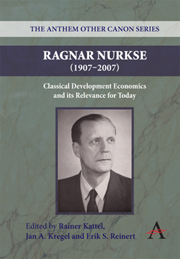Book contents
- Frontmatter
- Contents
- Preface
- Title in the series
- 1 The Relevance of Ragnar Nurkse and Classical Development Economics
- 2 Life and Time of Ragnar Nurkse
- 3 Nurkse and the Role of Finance in Development Economics
- 4 Early Development Theory from Sun Yat-sen to Ragnar Nurkse
- 5 The Roots of Unequal Exchange: Mihail Manoilescu and the Debate of the 1930s
- 6 Nurkse and the Early Latin American Structuralists: A Reflection on Development Theory, Industrialization and their Relevance Today
- 7 Lewis, the Long Wave and Industrialization in the Periphery
- 8 Ragnar Nurkse and the Law & Economics of Development
- 9 Ragnar Nurkse's Development Theory: Influences and Perceptions
- 10 Nurkse meets Schumpeter: Is Microfinance a ‘Silver Bullet’ to Economic Development?
- 11 Stockpiling of International Reserves and Development: a Misguided Link
- 12 International Currency Experience and the Bretton Woods System: Ragnar Nurkse as Architect
- 13 Some Reflections on Nurkse's Patterns of Trade and Development
- 14 India and Development Economics: External Influences and Internal Responses
- Notes
8 - Ragnar Nurkse and the Law & Economics of Development
Published online by Cambridge University Press: 05 March 2012
- Frontmatter
- Contents
- Preface
- Title in the series
- 1 The Relevance of Ragnar Nurkse and Classical Development Economics
- 2 Life and Time of Ragnar Nurkse
- 3 Nurkse and the Role of Finance in Development Economics
- 4 Early Development Theory from Sun Yat-sen to Ragnar Nurkse
- 5 The Roots of Unequal Exchange: Mihail Manoilescu and the Debate of the 1930s
- 6 Nurkse and the Early Latin American Structuralists: A Reflection on Development Theory, Industrialization and their Relevance Today
- 7 Lewis, the Long Wave and Industrialization in the Periphery
- 8 Ragnar Nurkse and the Law & Economics of Development
- 9 Ragnar Nurkse's Development Theory: Influences and Perceptions
- 10 Nurkse meets Schumpeter: Is Microfinance a ‘Silver Bullet’ to Economic Development?
- 11 Stockpiling of International Reserves and Development: a Misguided Link
- 12 International Currency Experience and the Bretton Woods System: Ragnar Nurkse as Architect
- 13 Some Reflections on Nurkse's Patterns of Trade and Development
- 14 India and Development Economics: External Influences and Internal Responses
- Notes
Summary
We economists should always be ready to adapt the framework of our thinking if our work is to have relevance to the changing real world. (Nurkse 1959, 283)
Introduction
Ragnar Nurkse (1907–1959) is one of the founding fathers of classic development economics (also called classical economic development theory, or early development economics) as it emerged during the times after World War II. His work on capital formation, balanced growth and international capital flow was highly important, and his influence as an academic teacher at Columbia University was significant. In several respects, Nurkse is quite easily applicable today, not least because his ideas of globalization and governance are largely the ones used currently (see Nurkse 1952a, 576) – even down to the importance of tourism (1935a, 21).
The purpose of this essay is first, to show that Nurkse can also be classified as a Law & Economics thinker. Given the recent interest in the Law & Economics of Development, showing how a classic figure in the field successfully used such an approach might be of considerable interest, especially because development economics is an emotional field that may well profit from the ‘objectivizing’ the function of Law & Economics. Nurkse's classic contribution underlines that, and how development economics can be done sine ira et studio, and perhaps to a greater effect, via, or at least including, such an approach.
- Type
- Chapter
- Information
- Ragnar Nurkse (1907–2007)Classical Development Economics and its Relevance for Today, pp. 167 - 182Publisher: Anthem PressPrint publication year: 2009



